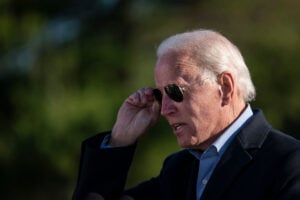Fifth Circuit Pauses Ban On Biden Admin Flagging Online Misinformation
It was the very least they could do, but ... they did it.

(Photo by Drew Angerer/Getty Images)
On July 4, US District Judge Terry Doughty blocked the entire Biden administration — more or less — from communicating with social media companies. A motley crew including Robert F. Kennedy Jr, the Gateway Pundit’s Jim Hoft, and the attorneys general of Missouri and Louisiana sued dozens of government defendants claiming that they had suppressed the plaintiffs’ First Amendment rights.
The theory of the case is that the government made a tacit threat to overturn Section 230 of the Communications Decency Act, which immunizes websites for user-generated content, and thus the social media platforms were unwillingly conscripted to act as government agents when they removed anti-vaccine and election misinformation. There’s virtually no evidence that the Biden administration made any such threat, which would be ridiculous since only Congress can change the laws. And in reality, the main proponents of § 230 repeal are Republicans, not Democrats.

Why Do AI And Legal Professionals Make The Perfect Partnership?

Moreover, the website-as-government-actor theory has been rejected by every other court to consider it — although, to be fair, most of those courts were in the heathen Ninth Circuit, thanks to binding forum selection clauses in the platforms’ terms of service. The plaintiffs here conveniently sidestepped this issue by suing only the government, which allowed them to avail themselves of the hospitality of the Western District of Louisiana.
In Doughty’s telling, it didn’t even matter that the government was largely leaning on the platforms to comply with their own terms of service:
Therefore, the question is not what decision the social-media company would have made, but whether the Government “so involved itself in the private party’s conduct” that the decision is essentially that of the Government. As exhaustedly listed above, Defendants “significantly encouraged” the social-media companies to such extent that the decision should be deemed to be the decisions of the Government.
So after a year and six extensions of time for discovery, and absent any showing that the plaintiffs’ horse dewormer and Big Lie posts were in danger of imminent suppression, the court granted “emergency” injunctive relief and banned the government from “engaging in any communication of any kind with social-media companies urging, encouraging, pressuring, or inducing in any manner for removal, deletion, suppression, or reduction of content containing protected free speech.”
Sponsored

Diving Into Generative AI: A Practical Guide For Law Firms Starting From Scratch

Gain An Instant Understanding Of New Complaints With LexisNexis Snapshot

Why Do AI And Legal Professionals Make The Perfect Partnership?


From AI To KPI: The Law Department Tech Trends Of 2024
The government requested a stay pending appeal, but Doughty refused, reasoning that “Violation of a First Amendment Constitutional right, even for a short period of time, is always irreparable injury.”
The government then sought emergency appellate relief, and this afternoon the Fifth Circuit issued a brief, per curiam order, staying Judge Doughty’s ruling administratively and expediting the appeal.
IT IS ORDERED that this appeal is EXPEDITED to the next available Oral Argument Calendar.
IT IS FURTHER ORDERED that a temporary administrative stay is GRANTED until further orders of the court.
IT IS FURTHER ORDERED that Appellants’ opposed motion for stay pending appeal is deferred to the oral argument merits panel which receives this case.
And so Judge Doughty’s plan to save Free Speech by issuing the greatest prior restraint on speech in several decades will have to wait a little bit longer.
Missouri v. Biden [Fifth Circuit Docket, via Court Listener]
Missouri v. Biden [Trial Docket, via Court Listener]
Sponsored

Law Firms Now Have A Choice In Their Document Comparison Software

From AI To KPI: The Law Department Tech Trends Of 2024
Liz Dye lives in Baltimore where she writes about law and politics and appears on the Opening Arguments podcast.







